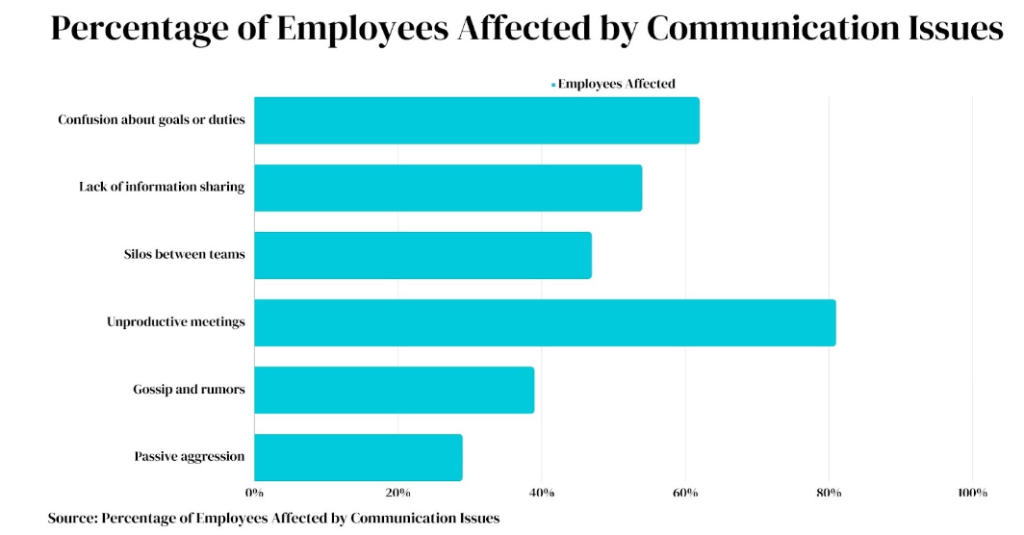Elevating Office Performance: Bridging the Gap Between Productivity and Communication
- Updated on: September 24, 2024
Communication issues can slow things down at work. When people don’t understand each other, projects drag, mistakes happen, and frustration builds. Good communication, however, can make workflows smooth and lead to skyrocketing productivity. This article will look at ways to supercharge your office by improving communication between coworkers and teams.
How Communication Fuels Productivity
Let’s start by looking at just how much communication affects productivity. Studies show that when communication works well, employees get a lot more done. In fact, around 9 out of 10 workers say that good communication is key to their productivity. It helps them collaborate more effectively and prevents delays caused by misinformation.
Some other eye-opening stats:
- Companies that excel in communication experience a 50% reduction in employee turnover. This saves a ton on hiring and training costs.
- Poor communication costs companies approximately $420,000 annually for every 100 employees. That’s almost half a million dollars in lost productivity per year!
- 1 out of every 3 employees may even look for another job if their workplace has poor communication practices. This causes an expensive brain drain.
The bottom line is that communication has a giant impact on both productivity and employee retention. Ignoring issues can drain your bottom line fast. But improving communication brings big rewards.
Have you ever faced distractions at work?
Signs You Have a Communication Problem
How can you tell if your office needs help with communication? Here are some red flags to watch out for:
- Confusion about goals or duties – Employees seem unsure about priorities and expectations. They keep asking basic questions.
- Lack of information sharing – People seem reluctant to share status updates. They hoard information instead of keeping teams in the loop.
- Silos between teams – Departments don’t collaborate and seem disconnected from each other’s work. Automated provisioning of communication channels can help bridge these gaps.
- Unproductive meetings – Discussions drift off topic. Decisions are unclear. Nothing gets resolved.
- Gossip and rumors – Employees chat at the water cooler about unsubstantiated issues instead of talking openly.
- Passive aggression – People make snide comments but won’t address issues directly. Minor conflicts spiral out of control.
The data illustrates how prevalent these communication problems are, with unproductive meetings affecting over 80% of workers. Tackling issues like gossip and unclear goals can significantly improve productivity and morale.
Don’t ignore these warning signs! The longer communication issues drag on, the worse they usually get. Morale and performance plummet when employees feel out of sync. Take proactive steps to get communication back on track.
Strategies to Bridge Communication Gaps
Here are some powerful yet practical ways to boost understanding and collaboration between coworkers:
Get Everyone on the Same Page
Do people use Slack, Outlook, Gmail, Trello, Asana, Skype, Zoom, and a dozen other apps to communicate? It’s too confusing! Standardize on just a few key platforms so information lives in one spot. This prevents people from missing key updates in their inbox flood. It also reduces the mental fatigue of context-switching between apps all day.
Promote Transparency
Share company information openly instead of leaving people guessing. Be clear about goals, metrics, challenges, changes, and reasons behind decisions. Honesty builds trust and helps employees understand how their work fits the big picture.
Encourage transparency from employees too. Make it safe to give upward feedback, share ideas, and admit mistakes. Listen without judgment and thank people for their candor.
Promote Better Collaboration
Silos prevent the cross-pollination of ideas between teams. Encourage collaboration with tools like Slack, Asana, and Miro for easy brainstorming and file sharing. Create open workspaces where people can pop up to chat instead of hiding in cubicles all day.
Rotate staff between teams once in a while. This builds empathy and prevents tunnel vision. Friendly competitions and social events also bring people together.
Automate Where Possible
New technologies, such as AI chatbots, can handle common questions and automate repetitive communications. This frees up humans for more complex creative tasks. For businesses looking to leverage AI to its fullest potential, training ChatGPT on custom data can enable it to respond with organization-specific insights, improving both accuracy and relevance in interactions.
However, it’s important to invest time in getting staff on board with new technology. Train them well and address any concerns about automation. Ensure data security is safeguarded as well.
Did you know you can easily show your colleagues when you're busy?
Frequently Asked Questions
Why is good communication so vital for workplace productivity?
Effective communication enables employees to fully understand their objectives and responsibilities. It prevents errors, frustration, and wasted time from confusion. When coworkers can collaborate seamlessly, work is accomplished quickly.
What signs may indicate my office has a communication problem?
Look for things like uncertainty about priorities, lack of information sharing, gossip, and indirect hostility. Also notice if teams seem disconnected, meetings are fruitless, and employees seem displeased.
How can I consolidate our numerous apps and platforms for communication?
Try reducing the number of different applications people use to connect. Select just a couple of key platforms like Slack or Microsoft Teams so individuals know where to find updates. Excessive apps cause disorientation.
What if some workers resist new communication systems or training?
Be patient and clearly explain how the new tools and training will simplify their work. Demonstrate how improved communication assists the whole company in providing superior customer service. Consider incentives for completing training if necessary.
How can I evaluate if our communication is progressing?
Track metrics like email volume, meeting duration, goal achievement, and personnel satisfaction surveys. Better understanding should enable smoother teamwork and productivity. But be steady with new strategies – change takes time to materialize.
Luxafor Flag busy light
Eliminate distractions;
Achieve deep work by controlling your workflow.
Conclusion
Good communication starts with you. Don’t wait around for others to fix things. Make the first move to open up conversations. Smile and say hi to coworkers in the hallway. Ask how their day is going and listen when they answer. Show interest in their work and offer to help if you can. Invite someone new to join you and others at lunch. Get to know your teammates better as people. Find common interests besides work to chat about like sports, movies, pets, or food. Be friendly and patient with anyone who seems stressed. Kindness relieves tension fast. Keep an open mind if you disagree with someone. Stay positive and cooperative. When we make an effort to connect more sincerely, communication gets easier for everyone. Our workplace becomes a happier space to be in!
LUXAFOR HELPS PEOPLE TO ACHIEVE THEIR GREATEST PRODUCTIVITY LEVELS WITH A WIDE VARIETY OF OFFICE PRODUCTS. LET’S BE PRODUCTIVE TOGETHER!






